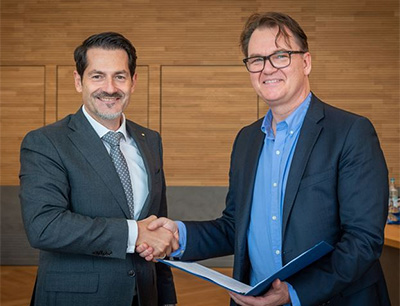
Clariant and the Technical University of Munich (TUM) have renewed their long-term strategic alliance in the field of research and application of new catalyst systems. The cooperation project "MuniCat", an abbreviation of Munich Catalysis, has been developing improved catalyst compositions and designs as well as novel process technologies since 2010. In the future, the project will address the upcoming challenges in the field of sustainable chemistry and the use of catalysis. The "MuniCat" alliance combines the expertise of both partners in researching, improving and applying existing, as well as novel catalysts and processes. The joint research has already produced a number of solutions to manufacture chemical products in a more energy-efficient and environmentally friendly way.
“Over the years, the collaboration between Clariant and TUM has paved the way for many milestones not only in the field of R&D in catalysis but also in creating a more sustainable future for the chemical industry”, said Marvin Estenfelder, Head of R&D at Clariant. “The partnership has been very symbiotic, in that we have access to cutting edge research methods and technologies developed at the university while the young TUM researchers benefit from our long industry and applications expertise. We are therefore delighted to extend this fruitful partnership for another ten years.”
To date, more than 30 projects have been completed during the course of the collaboration, addressing challenges faced by industry in its quest for greater sustainability and efficiency. These projects have been able to produce numerous proprietary developments for catalyst compositions and for their production and commercial use. To date, more than 250 scientific articles on technical progress have been published in publications with global reach. “Any meaningful transition towards sustainability in the chemical industry can only succeed with collaboration and innovation. That’s why we are delighted to join forces with a renowned academic institution like TUM and leverage our sustainability-driven innovations with new methods in academia to accelerate the energy transition”, adds Richard Haldimann, Chief Technology and Sustainability Officer at Clariant.
Most of the "MuniCat" projects address sustainability issues, such as the reduction of greenhouse gas emissions, the conversion and use of CO2, the use and storage of hydrogen, and the development of new raw materials for basic chemicals. New projects addressing these issues already exist. Some of them rely on artificial intelligence, machine learning and digitization methods.
A collaboration between Clariant, TUM and Linde, for example, has produced new catalysts for the oxidative dehydrogenation of ethane. They represent a low-emission catalytic technology for the production of ethylene. The novel catalyst embodies a quantum leap in selectivity and productivity and enables a reduction in CO2 emissions of up to 100 percent compared to conventional steam cracking.
“With the renewal of the MuniCat Alliance, TUM and Clariant ensure the continuation of a true success story for the catalyst industry. Thanks to the established Industry on Campus concept, TUM scientists work together with Clariant researchers as pioneers on important research fields to develop even more efficient, profitable, and sustainable catalysts for the industrial sector”, says Prof. Kai-Olaf Hinrichsen of Technical University Munich. The partnership will address current and future sustainability challenges. Areas of focus include new technologies that further develop the hydrogen economy and sustainable aviation fuels, as well as high-performance catalysts for the conversion of CO2 into short-chain alcohols. Aspects of catalyst and recyclables recycling will also play a critical role in the future project agenda. Standard modeling and simulation tools using artificial intelligence and machine learning will also be used and further developed to achieve the highest level of quality. “We are now shifting focus to new developments in sustainable chemistry and their practical application in the industry. This partnership therefore significantly contributes to our TUM Sustainable Futures Strategy 2030, with which we aim to make TUM a driver of sustainable transformation”, adds TUM President Prof. Thomas F. Hofmann.